Replacing The Habit
Analyzing Our Motivations and Methods for Ending Habitual Behaviors
Bad habits come in all shapes and sizes. From classic examples like biting your nails or cracking your knuckles to more modern cases like overworking or compulsively checking social media, we all have them.
But where do they come from, and are we truly at fault for engaging in these vices?
To understand the nature of habitual behavior, and how to stop it, we polled 1,000 people across the country about their "bad" habits. We asked them about motivations to quit, the difference in time between how long it would take to quit and how long it actually took, and the kinds of support systems they had in place to help them along the way. Want to know what helps people to abstain from smoking, drinking, or engaging in other indulgences? Read on to find out.
Pesky Patterns
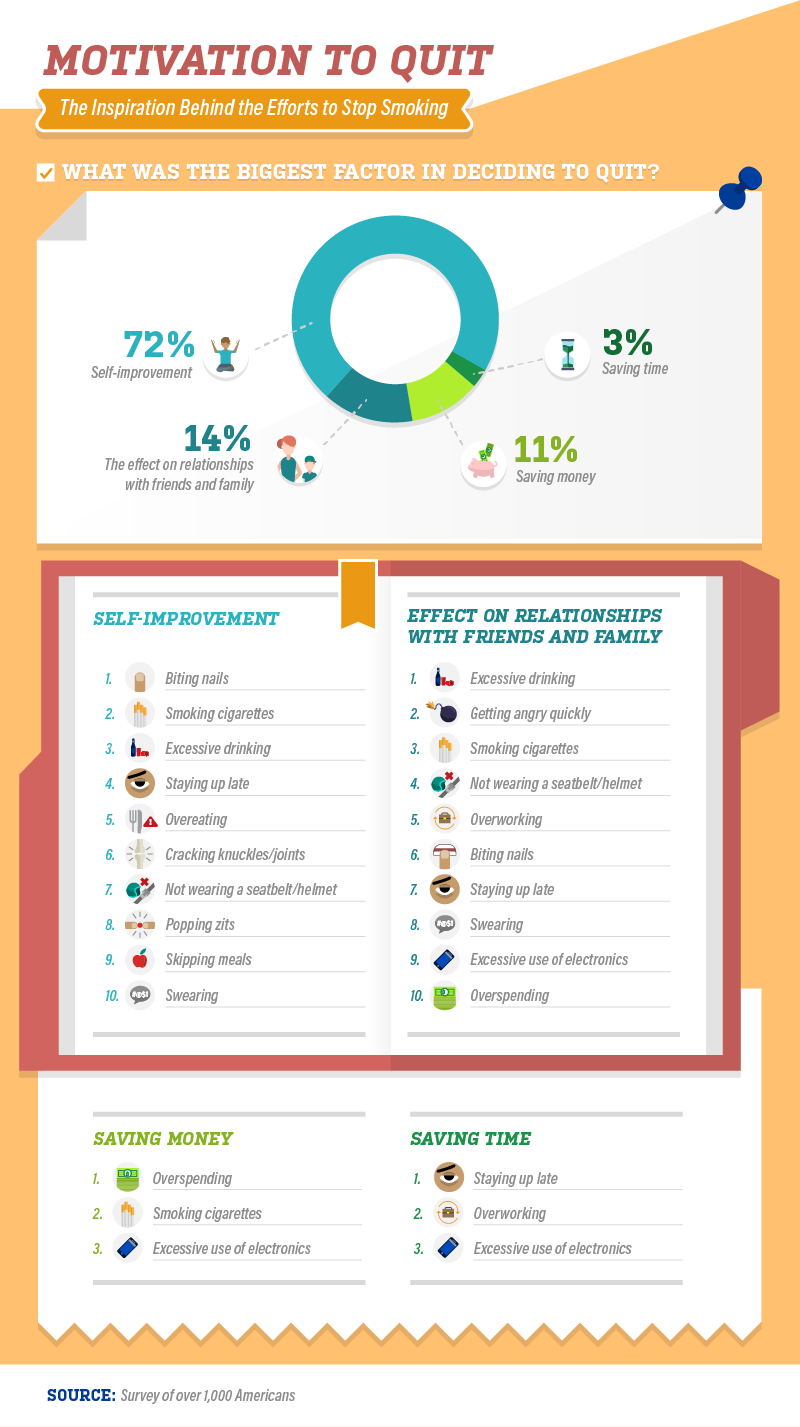
When it comes to bad habits, it's not your fault if breaking them turns out to be more difficult than you may have anticipated. In fact, if you've been trying to quit anything from smoking to shopping and it's proving harder than expected, you might want to thank your orbitofrontal cortex (OFC) for the hassle. The OFC controls our goal-directed actions, except when those neurons aren't firing and pesky habits step in instead.
That doesn't equate to a complacency with all of your habits, however. Nearly 3 out of 4 Americans we polled about their habitual behavior said they wanted to quit to help make themselves better. For another 14 percent, their motivation was the impact their behaviors were having on the people around them. Saving time and money were also considerations (although less popular motivators) for the Americans we polled.
The most common habit Americans told us they wanted to break for their own self-improvement? Nail biting. Even though the habit might say something positive about your personality, it can still be an unsightly urge most people are looking to leave behind. Smoking cigarettes, staying up too late, and excessive drinking were also common habits among those we polled. Excessive drinking was also the most common habit people wanted to break because of the impact it had on the people around them.
Support Structure
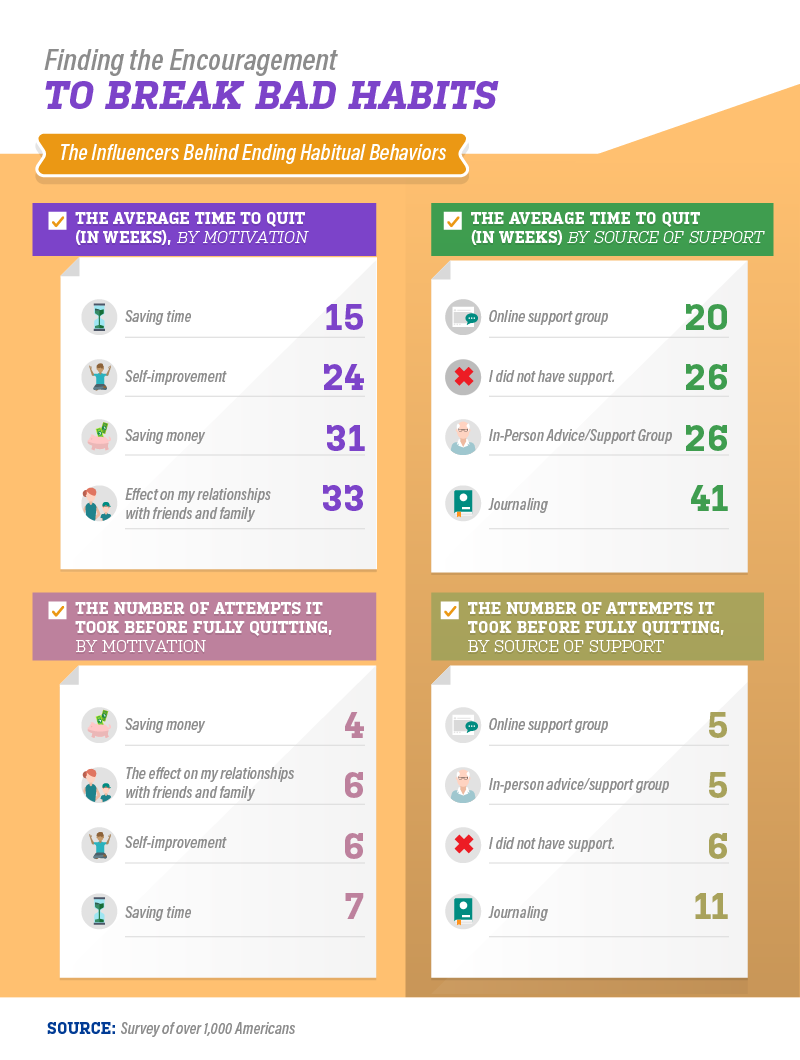
Just because your brain is doing most of the heavy lifting doesn't mean that breaking a habit should be a solo effort. Having the right motivation and support to help you give up harmful, habitual behaviors can influence the amount of time it takes to fully break the cycle of routine. Regardless of the path you choose on your journey toward self-improvement or building better relationships, experts on human behavior indicate being committed to quitting can be one of the most important steps you take. Breaking your bad habit may not be fast (or easy), but it can certainly be worth it.
People who told us that saving time was their biggest motivation revealed that quitting their bad habits took the shortest amount of time on average—15 weeks. In contrast, people who were quitting to save money or because of the effect those habits were having on friends and family told us it took twice as long (or more) to be rid of their damaging behaviors. For habits like excessive drinking, our bodies can play a larger role in how difficult it is to move forward with physical and mental withdrawal symptoms that are likely when you try to quit cold turkey.
Our survey also revealed that it took half as long for people who used online support to break their habits compared to those who told us they used methods like journaling. People who've used online support like social media to help quit habits have expressed a sense of community and support that provided increased motivation.
The Time It Takes to Quit
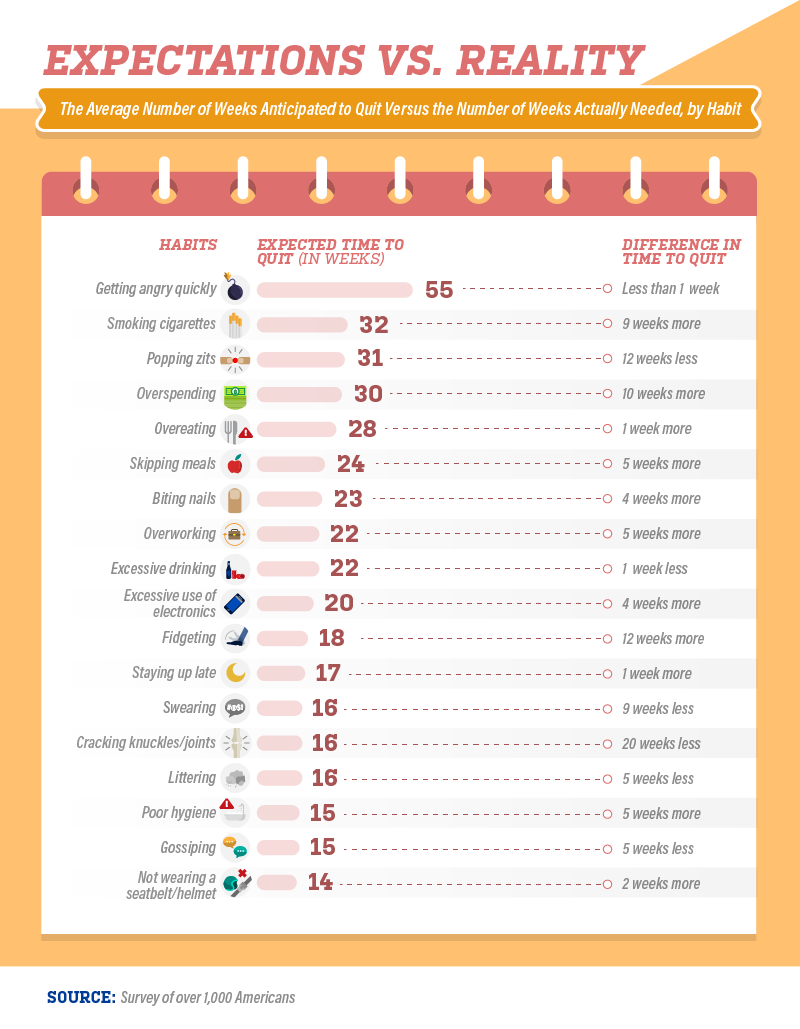
Having the right expectations about how long it might take to quit something can help keep you from getting discouraged along the way. For the same reason that nutritionists recommend not getting on a scale when you start a new diet, having realistic expectations will make it easier to reach your goal.
Some respondents told us it took weeks, months, or even more than a year to finally break their bad habits. Based on their perceptions, some took more time while others took less than originally anticipated. While people we polled who wanted to curb their tempers told us it took over a year to manage their anger, they also told us that they had expected the journey to take that long.
People who told us they struggled with excessive drinking revealed it took 22 weeks (on average) to break the habit, about a week less than they anticipated. People who told us they wanted to quit smoking cigarettes said it took them 32 weeks—more than two months longer than they thought it would. The nicotine found in cigarettes has strong addictive properties that can enter the bloodstream in as little as 10 minutes, creating a sense of pleasure and energy. Once that feeling fades, you may immediately want it back. When you quit, or even try to cut back on the amount you smoke, you may experience feelings of anxiety, irritability, and even cravings for more cigarettes. This cycle can make smoking one of the most difficult habits to break.
The science behind this kind of addiction doesn't solely apply to cigarettes, either. Whether it's drugs and alcohol, or even pleasurable activities like sex, our brains release a chemical called dopamine that convinces us our actions feel better than they actually do. In the case of drugs, which can heighten dopamine levels, our bodies become even more addicted to the sensation produced by the increased chemical components, making it harder—but not impossible—to break the habit.
Out With the Old, In With the New
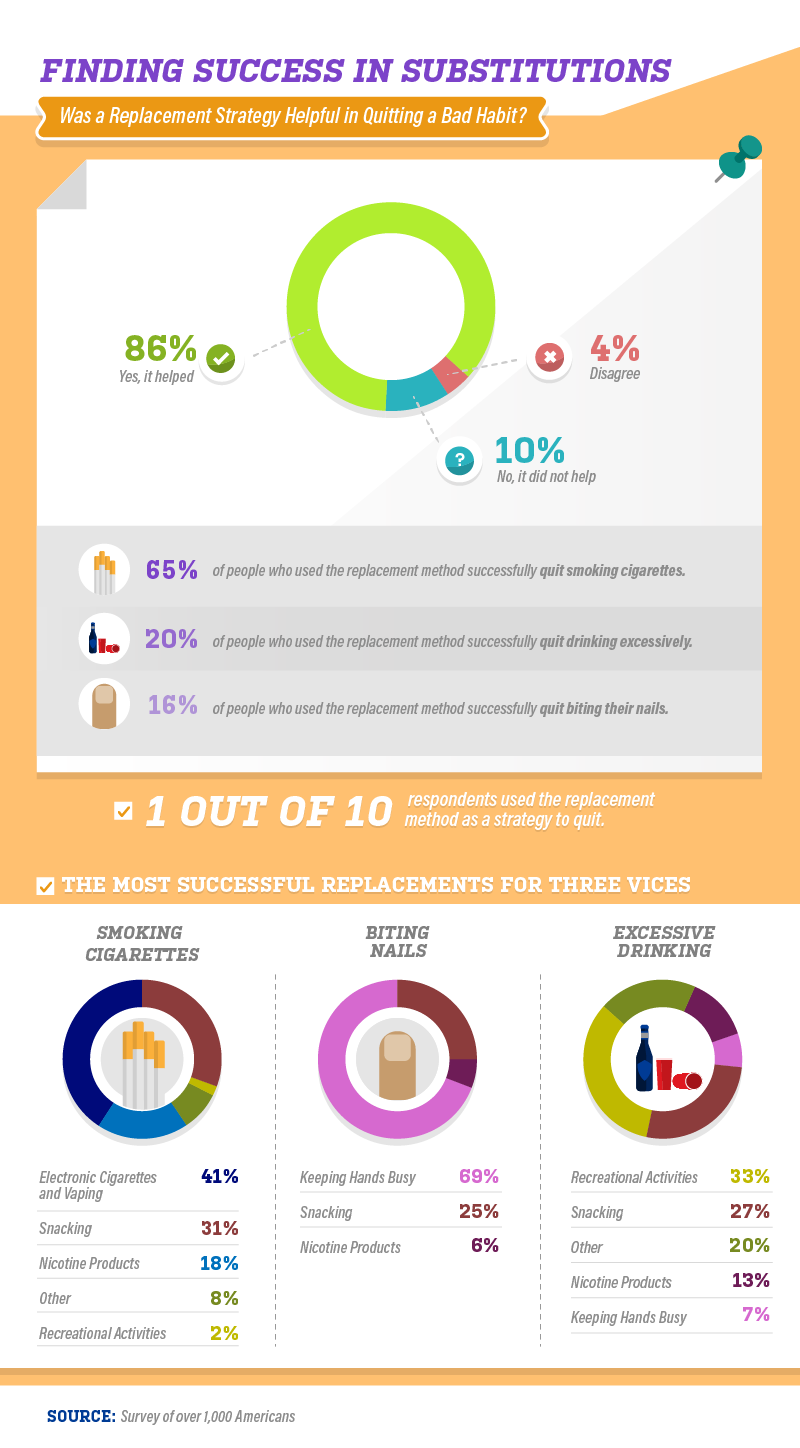
When it comes to the science of bad habits, experts say that substituting or replacing those habits with new hobbies or behaviors can help keep your mind busy when those OFC neurons slow down. Essentially, when you feel compelled to bite your nails or crack your knuckles, consider eating vegetables or going for a jog instead. Replacing your habits can also help reduce the stress and anxiety that sometimes trigger the original urges.
Of the 1,000 people we polled about their bad habits, 1 in 10 told us they used the replacement method as their strategy to quit. Of those, nearly two-thirds were able to quit smoking, and roughly 1 in 5 were able to quit drinking excessively. Only 4 percent of people we polled who said they used the replacement method to quit a bad habit indicated the process didn't help them at all.
It can be hard to quit smoking, especially if you've already been doing it for years (or even decades), but more than 2 out of 5 people we polled told us that electronic cigarettes and vaping helped them kick the habit. They aren't alone, either. Independent studies have found that while vaping has side effects of its own, it can make an attempt to quit smoking more successful. Because electronic cigarettes don't contain tobacco, they reduce the cravings that can lead to addiction and withdrawal symptoms a person might experience when they stop smoking conventional cigarettes.
For a quarter or more of the people we polled who said they were able to quit habits including smoking, biting their nails, and excessive drinking, they indicated that snacking helped get them there. According to the American Cancer Society, eating up to six small meals throughout the day (that are non-sugary and non-spicy) can help reduce the urge to smoke, and it gives your mouth (and your brain) something to think about besides the urge to light a cigarette. Of course, you want to make sure you have healthy snacks at the ready so you don't have to quit junk food after you've successfully quit smoking.
No More Cigarettes
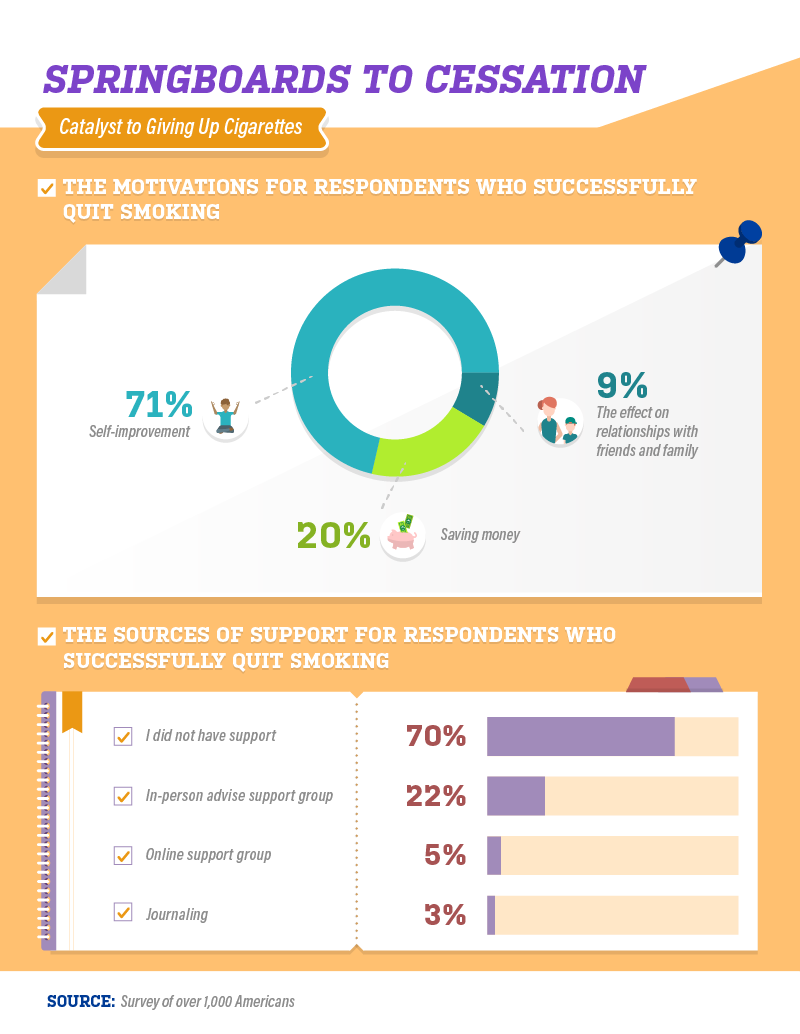
The effects of smoking on the body have been well documented. In the U.S. alone, smoking is the leading cause of preventable death across the country, causing more than 480,000 deaths every year. Smoking can increase your risk of cancer, stroke, and cardiovascular disease. Even if you've been smoking for years, quitting can significantly reduce the risks of many of these health effects. One year after quitting, your risk for heart attack drops significantly, and your chances of having a stroke can return to that of a nonsmoker just two to five years after quitting. Your risk for lung cancer is cut in half 10 years after you quit.
Of the people we polled who told us they quit smoking, nearly 3 out of 4 said they did it for their own self-improvement. Another 1 out of 5 said they did it to save money, and nearly 1 in 10 said they did it for the people around them. A majority of the people who quit told us they didn't have any support in the process, while more than 1 in 5 said they used an in-person support group to help them kick the habit. Five percent indicated they used an online resource or social media.
Preferable Substitutions
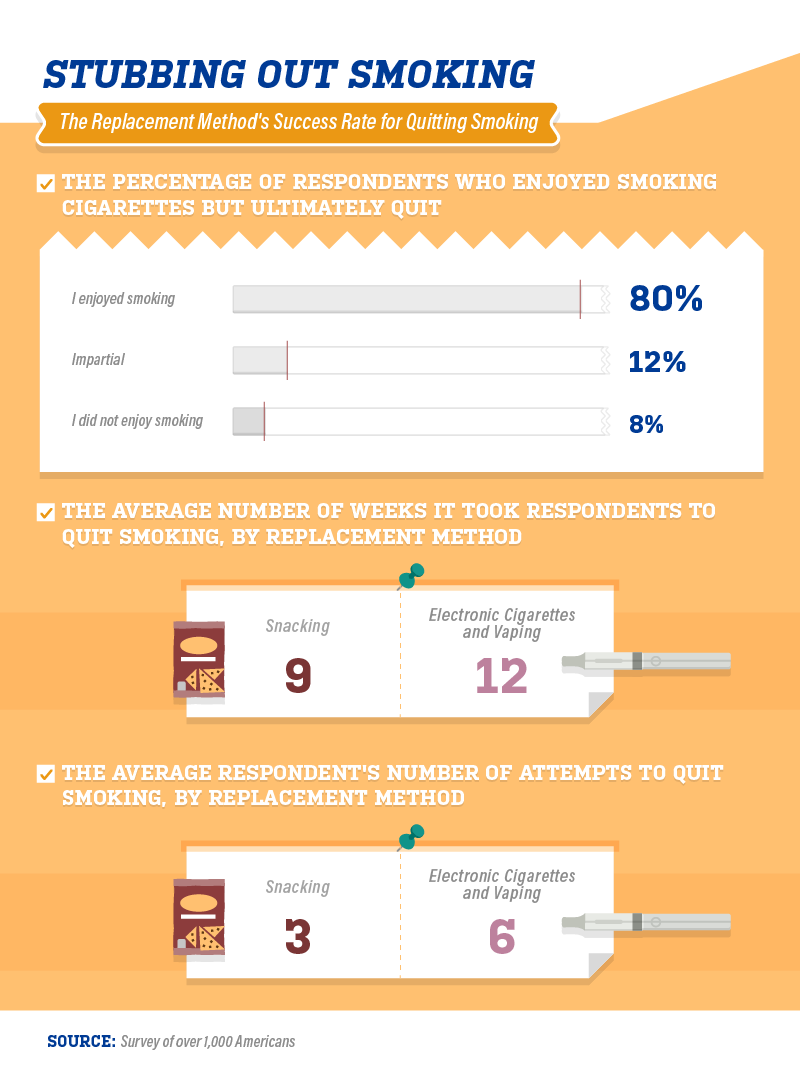
A majority of people we surveyed who told us they'd been able to quit smoking cigarettes indicated that they enjoyed the experience of smoking. Studies have shown that even though many Americans understand the effects of smoking on their bodies, they still enjoy the stimulation enough to continue doing it regardless of the consequences. Just as with drugs or alcohol, the cravings and effects associated with smoking cigarettes can lead to an addiction that worsens over time.
Those we polled who said they used the replacement method to help them cope with nicotine cravings and withdrawal symptoms indicated they had more success when they replaced smoking with snacking as opposed to replacing it with electronic cigarettes or vaping. People who enjoyed munching instead of vaping were able to cut the time it took them to quit by roughly 25 percent—nine weeks compared to 12. People we polled who told us they used snacking also told us it took fewer attempts to quit (three attempts versus six attempts) than those who replaced the habit with vaping and electronic cigarettes.
Breaking the Cycle
Regardless of the bad habits (or addictions) you may be battling, the truth is that your brain has a lot to say about how much you enjoy that habitual behavior and how difficult it can be to kick it to the curb. Americans we surveyed who broke some of the most difficult (and dangerous) habits used systems like replacement therapy, social media, and even journaling to help them cope with the urges and effects of cutting substances out of their lives.
If you or someone you love is struggling with addiction, help is here for you. Breaking the cycle doesn't have to be a solo effort, and having the right support can help you beat the various stages of withdrawal and detox that can follow after cutting dangerous, and sometimes deadly, substances out of your life. At RehabPathway, one of our goals is to help you understand the options available to help you recover as quickly and safely as possible.
https://www.sciencedaily.com/releases/2016/05/160526185419.htm
https://www.womansday.com/health-fitness/a56407/nail-biting-personality-trait/
https://www.entrepreneur.com/article/283178
https://www.webmd.com/mental-health/addiction/alcohol-withdrawal-symptoms-treatments#1
https://www.inc.com/tess-townsend/quit-smoking-social-media-2015.html
https://alissarumsey.com/stop-weighing-yourself/
https://betobaccofree.hhs.gov/
https://www.heart.org/en/healthy-living/healthy-lifestyle/quit-smoking-tobacco
https://www.nbcnews.com/health/health-news/e-cigarettes-help-smokers-quit-review-finds-n647811
https://www.ncbi.nlm.nih.gov/pmc/articles/PMC5997253/
https://www.cdc.gov/tobacco/data_statistics/fact_sheets/health_effects/effects_cig_smoking/index.htm
https://nida.nih.gov/publications/research-reports/tobacco-nicotine-e-cigarettes/nicotine-addictive
Methodology
We surveyed over 1,000 Americans on the habitual behaviors they once indulged in but eventually quit.
Fair Use
Would you like to share our content for noncommercial use? Link your readers back to this page, and please make a habit of it!

